- Home
- Chuck Palahniuk
Survivor Page 2
Survivor Read online
Page 2
Call me a sexual predator, but when I think of predators I think of lions, tigers, big cats, sharks. This isn’t so much a predator versus prey relationship. This isn’t a scavenger, a vulture, or a laughing hyena versus a carcass. This isn’t a parasite versus a host.
We’re all miserable together.
It’s the opposite of a victimless crime.
What’s most important is you need to put the stickers in public telephones. Try inside dirty phone booths near bridges over deep water. Put them next to taverns where people with no place to go get thrown out at closing time.
In no time at all, you’ll be in business.
You’ll need one of those speakerphones where it sounds like you’re calling from deep inside somewhere. Then people will call in crisis and hear you flush the toilet. They’ll hear the roar of the blender and know how you couldn’t care less.
These days, what I need is one of those cordless telephone headsets. A kind of Walkman of human misery. Live or die. Sex or death. This way, you can make hands-free life-and-death decisions every hour when people call to talk about their one terrible crime. You give out penance. You sentence people. You give guys on the edge the phone numbers of girls in the same position.
The same as most prayers, the bulk of what you hear is complaints and demands.
Help me. Hear me. Lead me. Forgive me.
The phone is ringing again already. The thin little coating of crumbs on the veal cutlet is almost impossible for me to get right, and on the phone is a new girl, crying. I ask right away if she’ll trust me. I ask if she’ll tell me everything.
My goldfish and me, both of us are just here swimming in one place.
The cutlet looks dug out of a box.
To calm this girl down, to get her to listen, I tell her the story about my fish. This is fish number six hundred and forty-one in a lifetime of goldfish.
My parents bought me the first one to teach me about loving and caring for another living breathing creature of God. Six hundred and forty fish later, the only thing I know is everything you love will die. The first time you meet that someone special, you can count on them one day being dead and in the ground.
The night before I left home, my big brother told me everything he knew about the outside world.
In the outside world, he said, women had the power to change the color of their hair. And their eyes. And their lips.
We were on the back porch in just the light from the kitchen window. My brother, Adam, was cutting my hair the way he cut wheat, gathering handfuls of it and cutting it with a straight razor at about the halfway point. He’d pinch my chin between his thumb and forefinger and force me to look at him straight on, his brown eyes darting back and forth between each of my sideburns.
To get my sideburns even, he’d cut one, then the other, then the first, over and over until both sideburns were gone.
My seven little brothers were sitting along the edges of the porch, watching the darkness for all the evils Adam described.
In the outside world, he said, people kept birds inside their houses. He’d seen it.
Adam had been outside the church district colony just one time, when he and his wife had to register their marriage to make it legal with the government.
In the outside world, he said, people were visited in their houses by spirits they called television.
Spirits spoke to people through what they called the radio.
People used what they called a telephone because they hated being close together and they were too scared of being alone.
He went on cutting my hair, not for style as much as he was pruning it the way he’d prune a tree. Around us on the porch boards, the hair piled up, not so much cut as harvested.
In the church district colony, we hung bags of cut hair in the orchard to scare away deer. Adam told me the rule about not wasting anything is one of the blessings you give up when you leave the church colony. The hardest blessing you give up is silence.
In the outside world, he told me, there was no real silence. Not the fake silence you get when you plug your ears so you hear nothing but your heart, but real out-of-doors silence.
The week they were married, he and Biddy Gleason rode in a bus from the church district colony, escorted by a church elder. The whole trip, the bus was loud inside. The automobiles on the road with them were roaring. People in the outside world said something stupid with their every breath, and when they didn’t talk their radios filled the gap with the copied voices of people singing the same songs over and over.
Adam said the other blessing you have to give up in the outside world is darkness. You can close your eyes, and sit in a cupboard, but that’s not the same thing. The darkness at night in the church district colony is complete. The stars are thick above us in this kind of darkness. You can see how the moon is rough with mountain ranges and etched with rivers and smoothed with oceans.
On a night without the moon or stars you can’t see a thing, but you can imagine anything.
At least that’s how I remember.
My mother was inside the kitchen ironing and folding the clothes I’d be allowed to take with me. My father was I don’t know where. I’d never see either of them again.
It’s funny, but people always ask if she was crying. They ask if my father cried and threw his arms around me before I left. And people are always amazed when I say no. Nobody cried or hugged.
Nobody cried or hugged when we sold a pig either. Nobody cried and hugged before they killed a chicken or picked an apple.
Nobody lay awake at night wondering if the wheat they’d raised was truly happy and fulfilled being made into bread.
My brother was just cutting my hair. My mother was just done ironing and she’d sat down to sew. She was pregnant. I remember she was always pregnant, and my sisters were all around her with their skirts spread on the kitchen benches or on the floor, all of them sewing.
People always ask if I was scared or excited or what.
According to church doctrine only the firstborn son, Adam, would ever marry and grow old in the church district. When we turned seventeen the rest of us, me and my seven brothers and five sisters, would all go out for work. My father lives here because he was the firstborn son in his family. My mother lives here because the church elders chose her for my father.
People are always so disappointed if I tell them the truth, that none of us lived in oppressed turmoil. None of us resented the church. We just lived. None of us were tortured by feelings very much.
That was the complete depth of our faith. Call it shallow or deep. There was nothing that could scare us. That’s how people raised in the church district colony believed. Whatever happened in the world was a decree from God; a task to be completed. Any crying or joy just got in the way of your being useful. Any emotion was decadent. Anticipation or regret was a silly extra; a luxury.
That was the definition of our faith. Nothing was to be known. Anything was to be expected.
In the outside world, Adam said it was a bargain with the devil that powered automobiles and carried airplanes across the sky. Evil flowed through electric wires to make people lazy. People put their dishes back in the cupboard dirty, and the cupboard washed them. Water in pipes carried away their garbage and shit so that it was someone else’s problem. Adam pinched my chin with his thumb and forefinger and leaned down to look me straight in the face, and said how in the outside world, people looked in mirrors.
Right in front of him on the bus, he said, people had mirrors and everyone was busy seeing how they looked. It was shameful.
I remember that was the last haircut I got for a long long time, but I don’t really remember why. My head was a bristling field of straw with just the short hairs that were left.
In the outside world, Adam said, all the counting was done inside machines.
All the food was fed to people by waitresses.
The one time he left the colony, my brother and his wife and the church elder who esco
rted them stayed overnight in a hotel in downtown Robinsville, Nebraska.
They didn’t any of them sleep. The next day the bus brought them home for the rest of their lives.
A hotel, he told me, was a big house where a lot of people lived and ate and slept, but no one knew each other. He said that described most families in the outside world.
Churches in the outside world, my brother told me, were just the local stores that sold people lies made up in the distant factories of giant religions.
He said a lot more I don’t remember.
That haircut was sixteen years ago.
My father had sired Adam and me and all fourteen of his children by the time he was the age I am now.
I was seventeen years old the night I left home.
The way my father looked the last time I saw him is the way I look now.
Looking at Adam was as good as looking in a mirror. He was my big brother by just three minutes and thirty seconds, but in the Creedish church district there was no such thing as twins.
That last night I ever saw Adam Branson, I remember thinking my big brother was a very kind and a very wise man.
That’s how stupid I was.
Part of my job is to preview the menu for a dinner party tonight. This means taking a bus from the house where I work to another big house, and asking some strange cook what they expect everybody to eat. Who I work for doesn’t like surprises, so part of my job is telling my employers ahead of time if tonight they’ll be asked to eat something difficult like a lobster or an artichoke. If there’s anything threatening on the menu, I have to teach them how to eat it right.
This is what I do for a living.
The house where I clean, the man and woman who live here are never around.
That’s just the kind of jobs they have. The only details I know about them are from cleaning what they own. All I can figure out is from picking up after them.
Cleaning up their little messes, day after day. Rewinding their videotapes: Full Service Anal Escorts. The giant breasts of Lethal Weapons. The adventures of little Sinderella.
By the time my bus drops me off here, the people who I work for are gone to work downtown. By the time they drive home, I’m back downtown in my housing voucher studio apartment that used to be just a tiny hotel room until somebody crowded in a stove and a fridge to raise the rent. The bathroom’s still out in the hall.
The only way I ever talk to my employers is by speakerphone. This is just a plastic box sitting on their kitchen counter and yelling at me to get more done.
Ezekiel, Chapter Nineteen, Verse Seven:
“And he knew their desolate palaces…” something, something, something. You can’t keep the whole Bible balanced in your head. You wouldn’t have room to remember your name.
The house I’ve been cleaning the last six years is about what you’d expect, big, and it’s in a real tony part of town. This is compared to where I live. All the studio apartments in my neighborhood are the same as a warm toilet seat.
Somebody was there just a second before you and somebody will be there the minute you get up. The part of town where I go to work every morning, there are paintings on the walls. Behind the front door, there are rooms and rooms nobody ever goes into. Kitchens where nobody cooks. Bathrooms that never get dirty. The money they leave out to test me, will I take it, the money is never less than a fifty-dollar bill, dropped behind the dresser as if by accident. The clothes they own look designed by an architect.
Next to the speakerphone is a fat daily planner book they keep full of things for me to get done. They want me to account for my next ten years, task by task.
Their way, everything in your life turns into an item on a list. Something to accomplish. You get to see how your life looks flattened out.
The shortest distance between two points is a time line, a schedule, a map of your time, the itinerary for the rest of your life.
Nothing shows you the straight line from here to death like a list.
“I want to be able to look at your planner,” the speakerphone yells at me, “and know exactly where I can find you at four o’clock on this day five years from now. I want you to be that exact.”
Seeing it down in black and white, somehow you’re always disappointed in your life expectancy. How little you’ll really get done. The resume of your future.
It’s two o’clock Saturday afternoon so according to my daily planner, I’m about to boil five lobsters for them to practice eating. That’s how much money they make.
The only way I can afford to eat veal is when I smuggle it home on the bus sitting in my lap.
The secret to boiling a lobster is simple. First you fill a kettle with cold water and a pinch of salt. You can use equal parts of water and vermouth or vodka. You can add some seaweed to the water for a stronger flavor. These are the basics they teach in Home Economics.
Most everything else I know is from the messes these people leave behind.
Just ask me how to get bloodstains out of a fur coat.
No, really, go ahead.
Ask me.
The secret is cornmeal and brushing the fur the wrong way. The tricky part is keeping your mouth shut.
To get blood off of piano keys, polish them with talcum powder or powdered milk.
This isn’t the most marketable job skill, but to get bloodstains out of wallpaper, put on a paste of cornstarch and cold water. This will work just as well to get blood out of a mattress or a davenport. The trick is to forget how fast these things can happen. Suicides. Accidents. Crimes of passion.
Just concentrate on the stain until your memory is completely erased. Practice really does make perfect. If you could call it that.
Ignore how it feels when the only real talent you have is for hiding the truth.
You have a God-given knack for committing a terrible sin. It’s your calling. You have a natural gift for denial. A blessing.
If you could call it that.
Even after sixteen years of cleaning people’s houses, I want to think the world is getting better and better, but really I know it’s not. You want there to be some improvement in people, but there won’t be. And you want to think there’s something you can get done.
Cleaning this same house every day, all that gets better is my skill at denying what’s wrong.
God forbid I should ever meet who I work for in person.
Please don’t get the idea I don’t like my employers. The caseworker has gotten me lots worse postings. I don’t hate them. I don’t love them, but I don’t hate them. I’ve worked for lots worse.
Just ask me how to get urine stains out of drapes and a tablecloth.
Ask me what’s the fastest way to hide bullet holes in a living-room wall. The answer is toothpaste. For larger calibers, mix a paste of equal parts starch and salt.
Call me the voice of experience.
Five lobsters is how many I figure they’ll take to learn the tricky details of getting the back open. The carapace, I figure. Inside’s the brain or the heart you’re supposed to be hunting for. The trick is to put the lobsters in the water and then turn up the heat. The secret is to go slow. Allow at least thirty minutes for the water to reach a hundred degrees. This way, the lobsters are supposed to die a painless death.
My daily planner tells me to keep busy, polishing the copper the best way, with half a lemon dipped in salt.
These lobsters we have to practice with are called Jumbos since they’re around three pounds apiece. Lobsters under a pound are called Chickens. Lobsters missing a claw are called Culls. The ones I take out of the refrigerator packed in wet seaweed will need to boil about half an hour. This is more stuff you learn in Home Economics.
Of the two large forward claws, the larger claw lined with what look like molars is called the Crusher. The smaller claw lined with incisors is called the Cutter. The smaller side legs are called the Walking Legs. On the underside of the tail are five rows of small fins called Swimmerets. More Home Economics
. If the front row of swimmerets is soft and feathery, the lobster is female. If the front row is hard and rough, the lobster is male.
If the lobster is female, look for a bony heart-shaped hollow between the two rear walking legs. This is where the female will still be carrying live sperm if she’s had sex within the past two years.
The speakerphone rings while I’m setting the lobsters, three male and two female, no sperm, in the pot on the stove.
The speakerphone rings as I turn up the heat just another notch.
The speakerphone rings while I wash my hands.
The speakerphone rings while I go pour myself a cup of coffee and mix in cream and sugar.
The speakerphone rings while I take a handful of seaweed from the lobster bag and sprinkle it in on top of the lobsters in the pot. One lobster lifts a crusher claw for a stay of execution. Crusher claws and cutter claws, they’re all rubber-banded.
The speakerphone rings while I go wash and dry my hands again.
The speakerphone rings, and I answer it.
Gaston House, I say.
“Gaston Residence!” the speakerphone yells at me. “Say it, Gaston Residence! Say it the way we told you how!”
What they teach you in Home Economics is it’s correct to call a house a residence only in printing and engraving. We’ve gone over this a million times.
I drink a little coffee and fiddle with the heat under the lobsters. The speakerphone keeps yelling, “Is anyone there? Hello? Have we been cut off?”
This couple I work for, at one party they were the only guests who didn’t know to lift the doily with the finger bowl. Since then, they’ve been addicted to learning etiquette. They still say it’s pointless, it’s useless, but they’re terrified of not knowing every little ritual.
The speakerphone keeps yelling, “Answer me! Damn it! Tell me about the party tonight! What kind of food are we going up against? We’ve been worried sick all day!”
I look in the cabinet over the stove for the lobster gear, the nutcrackers and nutpicks and bibs.
Thanks to my lessons, these people know all three acceptable ways to place your dessert silver. It’s my doing that they can drink iced tea the right way with the long spoon still in the glass. This is tricky, but you have to hold the spoon handle between your index and middle fingers, against the edge of the glass opposite your mouth. Be careful to not poke your eye out. Not a lot of people know this way. You see people taking the wet spoon out and looking for a place to set it and not wreck the tablecloth. Or worse, they just put it anywhere and leave a wet tea stain.

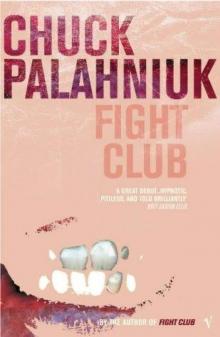 Fight Club
Fight Club Damned
Damned Tell-All
Tell-All Choke
Choke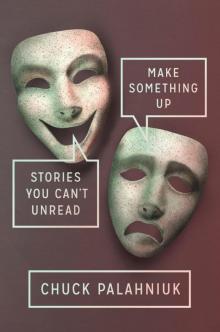 Make Something Up: Stories You Can't Unread
Make Something Up: Stories You Can't Unread Invisible Monsters
Invisible Monsters Phoenix
Phoenix Beautiful You: A Novel
Beautiful You: A Novel Haunted
Haunted Survivor
Survivor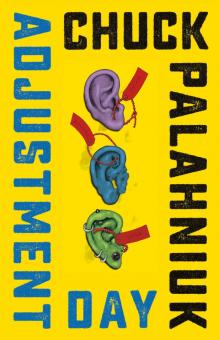 Adjustment Day
Adjustment Day Pygmy
Pygmy Doomed
Doomed Lullaby
Lullaby Snuff
Snuff Burnt Tongues
Burnt Tongues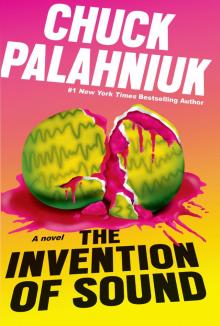 The Invention of Sound
The Invention of Sound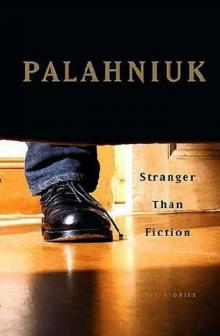 Stranger Than Fiction (True Stories)
Stranger Than Fiction (True Stories) Rant: The Oral History of Buster Casey
Rant: The Oral History of Buster Casey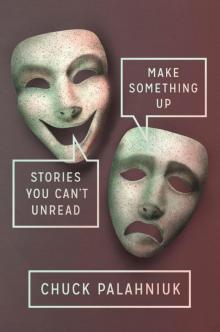 Make Something Up
Make Something Up Rant: An Oral Biography of Buster Casey
Rant: An Oral Biography of Buster Casey Doomed d-2
Doomed d-2 HOPE AND GORY
HOPE AND GORY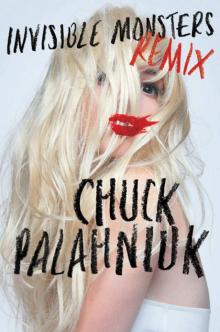 Invisible Monsters Remix
Invisible Monsters Remix Beautiful You
Beautiful You Fugatives & Refugees
Fugatives & Refugees